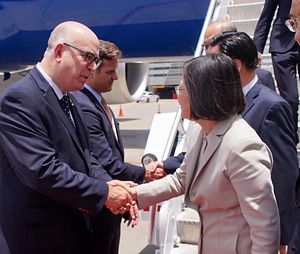Last Friday, U.S. President-Elect Donald Trump spoke with Taiwanese President Tsai Ing-wen on the phone, potentially signaling a shift in nearly 40 years of U.S. Taiwan policy. (We’ve discussed the fallout, and issues raised by the call, extensively here at The Diplomat.) China, predictably, was not pleased with the development; in addition to issuing an official protest, a Chinese Foreign Ministry spokesperson called on “the relevant party in the US to honor its commitment to the one China policy …and properly deal with Taiwan-related issues in a discreet manner, so as to avoid unnecessary disruptions to the overall China-US relationship.”
After the call, speculation over the future of Trump’s Taiwan policy turned toward a future data point. Guatemala, one of Taiwan’s diplomatic allies, has confirmed that Tsai is due to visit from January 11-12. Speculation is high that she may also attend the January 10 presidential inauguration in Nicaragua, another state with which Taiwan has diplomatic relations.
Regardless of which Central American countries Tsai visits, the more salient question for U.S.-Taiwan relations is whether Tsai will make a stopover at a U.S. airport en route, as has become customary for Taiwanese leaders. Without formal diplomatic relations, Taiwan’s president cannot make an official visit to the United States; layovers at U.S. airports have become a workaround that allows for informal (but significant) discussions between Taiwanese leaders and U.S. policymakers and legislators.
In the wake of Trump’s conversation with Tsai, however, China wanted to forestall any potential for further contact – particularly as Tsai may transit New York, where Trump is based. According to Reuters, Beijing called on the United States not to allow Tsai to stopover at a U.S. airport. “China hopes the United States ‘does not allow her transit, and does not send any wrong signals to ‘Taiwan independence’ forces,’” Reuters cited China’s Foreign Ministry as saying in a statement.
Foreign Ministry spokesperson Lu Kang, asked about China’s response to a potential stopover, told reporters, “The so-called transit diplomacy is only a petty trick played by the Taiwan leader, whose hidden political agenda should be clear to all.”
However, when asked about a potential transit stop, U.S. State Department spokesperson Mark Toner emphasized that such a stopover is “consistent with longstanding practice.” While not confirming anything about a still-unconfirmed January trip, Toner said, in general such a transit by Taiwan’s leader is “based on longstanding U.S. practice and it’s consistent with the unofficial nature of our relations with Taiwan… We usually allow them to transit here, if nothing else, for their comfort and convenience.”
Separately, Toner also told reporters that “we remain firmly committed to the ‘one China’ policy, and that’s based on the three joint communiques and the Taiwan Relations Act.”
A Trump adviser told Reuters it was “very unlikely” that the president-elect himself would meet with Tsai if she were to transit New York. However, one or more members of his advisory team might do so; Taiwanese presidents often meet with U.S. political figures during such stops. In July, during her first transit of the United States while president, Tsai met with Senator Marco Rubio and Representative Ileana Ros-Lehtinen in Miami.
Taiwanese media have speculated that Tsai might meet with Trump’s chief of staff, Reince Priebus, and/or former Secretary of Labor Elaine Chao, whom Trump has tapped for secretary of transportation. If Tsai does transit the U.S., the status and titles of the Trump advisers sent to meet her will send a strong signal as to the incoming administration’s stance on U.S.-Taiwan relations.
Tsai’s administration has not confirmed any details of the January trip, saying any announcement would only be made after the schedule has been finalized. The Presidential Office dismissed talk of a meeting with Trump advisers in New York as “media speculation.”
However, spokesperson Alex Huang also hit back at China for its request for Washington block a potential transit. “Such overreaction is unnecessary and is also not conducive to the normal development of cross-strait relations,” he said, arguing that Taiwan’s strong ties with both the United State and China were the key to regional peace.

































